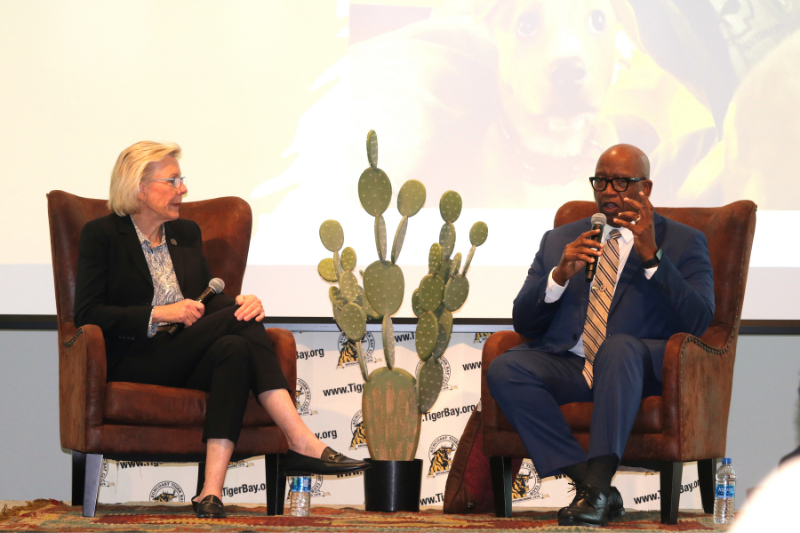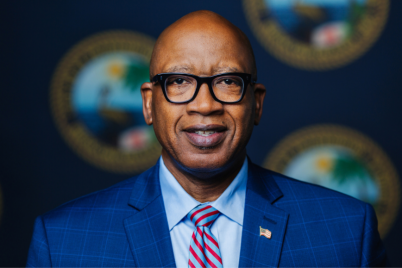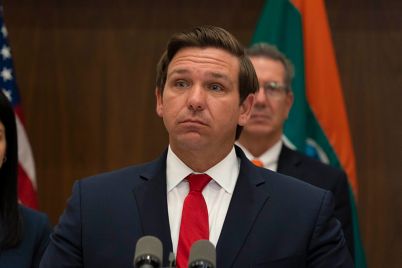Last month, Tampa Mayor Jane Castor and St. Petersburg’s Ken Welch chatted at the Suncoast Tiger Bay Club annual mayoral forum held at the James Museum.
BY J.A. JONES, Staff Writer
ST. PETERSBURG – In January, the Suncoast Tiger Bay Club held its annual mayoral forum at the James Museum of Western and Wildlife Art, led by its new president, Rev. J.C. Pritchett II.
St. Petersburg Mayor Ken Welch and Tampa’s Jane Castor answered questions from journalists and club members, sharing their views on issues including the future Rays stadium, affordable housing, and the controversial Senate Bill 620, which allows businesses to sue the local government if passed.
Welch presented a strong commitment to putting the concerns and needs of the city’s residents first when confronted with questions on how the city will spend its dollars.
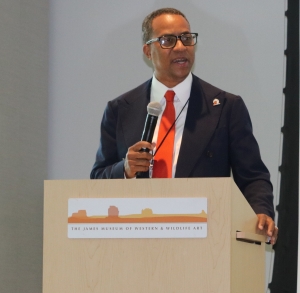
Rev. J.C. Pritchett II, president of the Suncoast Tiger Bay Club
Tampa Bay Times correspondent William March led by repeatedly grilling the mayors with questions regarding what he seemed to feel was the most important issue of the day — which side of the Bay will build the new Rays stadium, now that the Rays’ sister-city plan with Montreal is a no-go.
Castor answered first when March recommended the mayors respond in alphabetical order, stating that she never considered there would be any “type of bidding war or, you know, pull and push.” She also said both mayors agreed the region was too big to “lose a major league sporting franchise,” but there would be a bottom line for Tampa.
Welch responded, “The redevelopment of the Gas Plant and Tropicana Field is a priority. And within that is a secondary priority of the Rays. Making sure that those 35-plus-year promises of equitable development and jobs that were promised to the Gas Plant area come to fruition is my major priority.”
Welch also said having equitable redevelopment from now on was vital and that he felt the Rays could be part of that. He shared that he has spoken to the Rays and wants St. Pete to have its “final at-bat” chance to keep the team, whether Tropicana Field or a waterfront park. He mentioned the $100 million “bed tax” that tourists have paid as a substantial figure to help with the cost.
Later, he also stated, “The ROI has to make sense for the community. And so, the Rays or any sports franchise needs to bring something to the table that is equitable, and we need to look at it and what the total return is to the community. And so, if we’re talking about an $800 million stadium, the Rays need to bring, I think, half of it, if not more, to the table.”
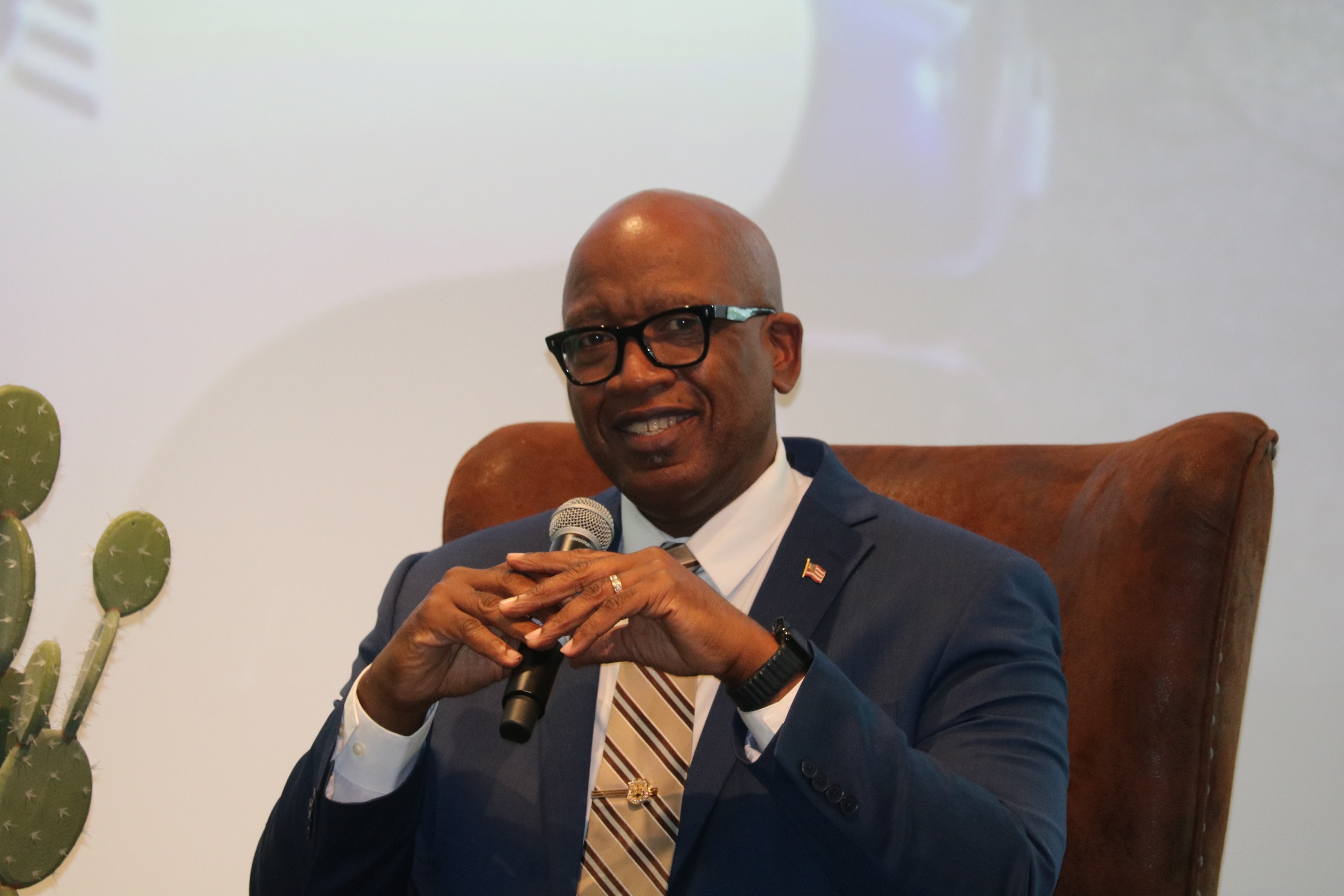
Welch said he wanted to review the Midtown Development team recommended by former Mayor Rick Kriseman. He will be reviewing all the financials to reconsider the Midtown proposal along with the Sugar Hill proposal.
Welch also looped the development of the Trop into the conversation, mentioning that he wanted to review the Midtown Development team recommended by former Mayor Rick Kriseman. He will be reviewing all the financials, he said, to reconsider the Midtown proposal along with the Sugar Hill proposal.
He said he’s examining the proposal to review how much affordable housing and workforce housing is included, among other things, to determine “if this is that the right fit for us now.”
“I’d like to see more truly affordable housing,” Mayor Welch stated. “The focus on workforce for folks making 100 to 120 percent of area median income, say $50 to $60,000, I think is too high. We are leaving behind folks who make that $25 an hour, $20 an hour, and less that make up more than half of our population. So, it’s those kinds of things that I’m looking at.”
Both mayors responded “no” when asked if either were willing to spend money on a stadium built on the other side of the Bay. When asked for their top three concerns, Castor answered, “Transforming Tampa’s Tomorrow” – which she said included looking at customer-centric services provided to the Tampa community, as well as transit, affordable housing, and workforce development.
Welch focused on the importance of understanding “intentionality” – and discussed the process by which the county’s Small Business Enterprise, under the leadership of Dr. Cynthia Johnson, prioritized being intentional about equity and took the program from $70,000 to $20 million in two years.
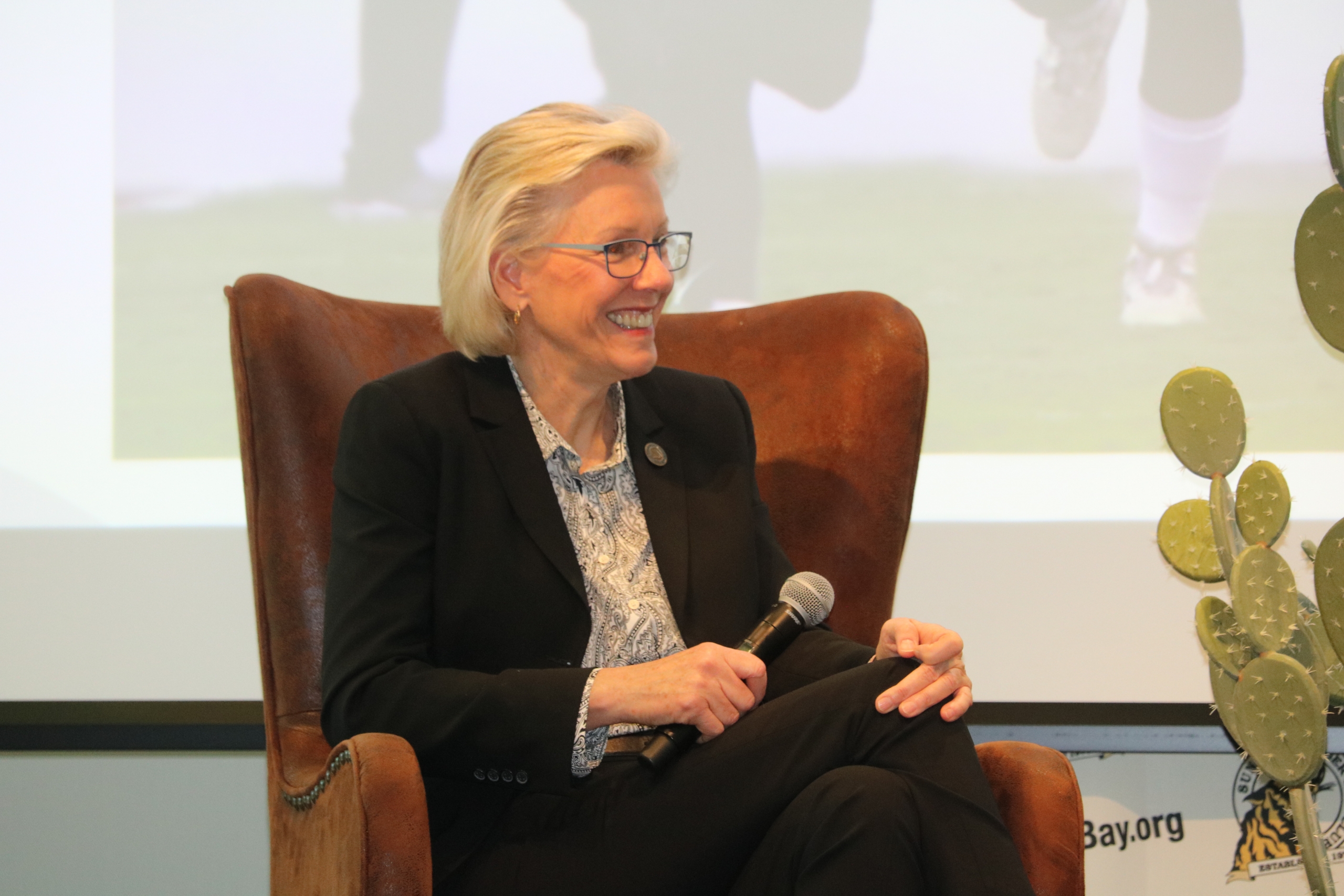
Castor said Senate Bill 620 is “simply ridiculous” and called it part of the continued attack on home rule. ‘This will hamstring any local municipality,’ she asserted.
Welch stressed that it was essential to be just as intentional about affordable housing – once again making it clear this was a priority that he was heavily focused on.
“I don’t want to see proposals come to us with five to 10 percent of workforce housing and call that a win. Because the folks who live in this community where the median income is $49,000 can’t afford that — median means more than half the people make less than that.”
Welch went on to say that with 80 to 90 percent of the current housing going on downtown being luxury housing, it’s not “for the people who are here already,” and expressing the need to provide for those who work in hotels, restaurants, and industries that dictate a lower-priced housing market.
Welch said funds could be brought into the area through the county’s housing trust fund, as well as dollars at the federal level – but the mayor made it clear that it will take an intentional focus to turn around the city’s housing crisis.
A question that rankled both mayors referred to Senate Bill 620, which would allow businesses to sue cities if local ordinances result in more than 15 percent profit loss. This legislation would ultimately result in taxpayers paying the bill for these lawsuits.
Welch took the stand first, calling it “egregious” and “preemption on steroids.” Pointing to the danger of such a bill, he referred to the recent fertilizer ordinance passed because of red tide and ecological issues.
If the bill is passed, lawsuits could result in taxpayers having to pay those companies for loss of income related to restrictions on when fertilizer was sold that were enforced to protect waterways.
Castor called it “simply ridiculous” and called it part of the continued attack on home rule. “This will hamstring any local municipality,” she noted.
Responding to the differences between being a county commissioner versus now being the mayor, Welch shared that his 20 years in public service had prepared him for most areas of the job. He admitted that there was a “concentration of focus on the mayor’s office that I had not expected, that started on election night” and joked that people were finally returning months-old calls he had made.
He also noted that law enforcement reporting directly to his office is a significant change.
Welch also thanked Castor, sharing that she had been a “great and open” ear during the election and that he followed her recommendation to get an office puppy to help reduce stress.

